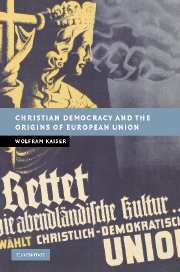Book contents
- Frontmatter
- Contents
- Acknowledgements
- Abbreviations
- Introduction
- 1 All paths to Rome? Transnational Catholicism in the nineteenth century
- 2 Under siege: Catholic parties in interwar Europe
- 3 After Versailles: left-Catholic cooperation
- 4 In the shadow of dictatorship: contacts in exile
- 5 Hegemony by default: Christian democracy in postwar Europe
- 6 Creating core Europe: the rise of the party network
- 7 Deepening integration: the supranational coalition embattled
- 8 Informal politics: from Rome to Maastricht
- Bibliography
- Index
- NEW STUDIES IN EUROPEAN HISTORY
8 - Informal politics: from Rome to Maastricht
Published online by Cambridge University Press: 14 July 2009
- Frontmatter
- Contents
- Acknowledgements
- Abbreviations
- Introduction
- 1 All paths to Rome? Transnational Catholicism in the nineteenth century
- 2 Under siege: Catholic parties in interwar Europe
- 3 After Versailles: left-Catholic cooperation
- 4 In the shadow of dictatorship: contacts in exile
- 5 Hegemony by default: Christian democracy in postwar Europe
- 6 Creating core Europe: the rise of the party network
- 7 Deepening integration: the supranational coalition embattled
- 8 Informal politics: from Rome to Maastricht
- Bibliography
- Index
- NEW STUDIES IN EUROPEAN HISTORY
Summary
When the European Commission was set up and began to work in Brussels at the start of 1958, transnational Christian democracy was still in a pivotal political position in core Europe. Its political hegemony appeared to be secure. At the end of 1958, the Christian democrats were the sole or dominant government party in Germany, Italy, Belgium and Luxembourg. Excluding the social democratic PvdA, the Dutch confessional parties formed a minority government in December 1958 before enlarging the coalition to include the Liberals in May 1959. The MRP at least played a minor role in the governments of the Fifth Republic after Pierre Pflimlin, its new party leader since 1956, resigned as the last prime minister of the Fourth Republic after only two weeks at the end of May 1958. In the EP, moreover, the Christian democrats formed by far the largest group, with 66 of 142 members. During the 1960s, five of six EP presidents were Christian democrats.
At the same time, transnational Christian democracy's European policy preferences were well embedded in the EEC Treaty. Its initial geographical limitation promised to allow the further deepening of the integration process without British interference for many years. Although the EEC Treaty articles concerning the two core supranational policy areas, the future CAP and competition policy were quite generally phrased, Christian democratic-controlled member-state governments could steer the policy deliberations and decision-making in the Council of Ministers in close collaboration with the Commission, which had the sole right of initiative.
- Type
- Chapter
- Information
- Christian Democracy and the Origins of European Union , pp. 304 - 325Publisher: Cambridge University PressPrint publication year: 2007



